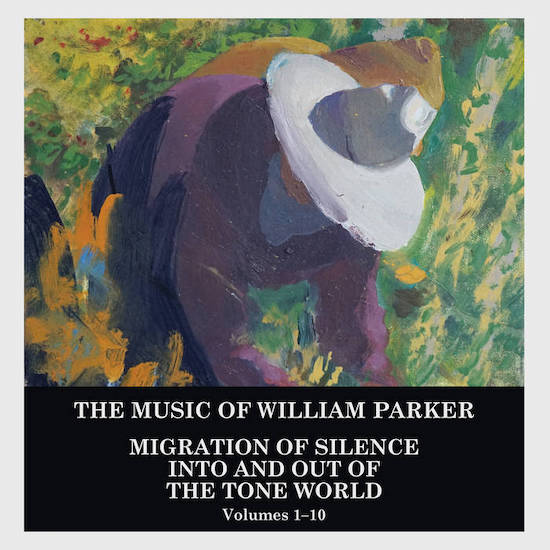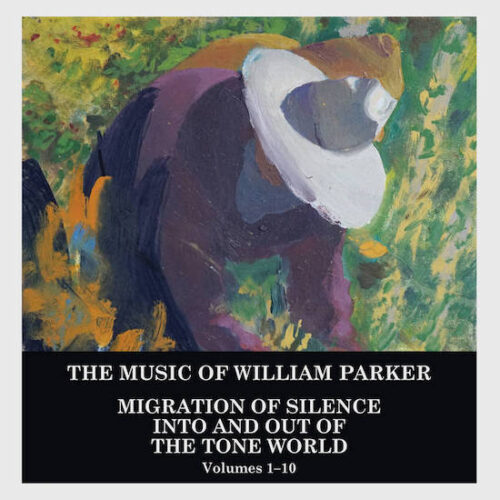The first thing you notice, of course, is the sheer scale of the thing. The box itself is slim, modest. But the ten discs and two booklets inside are, if not another world, then at least a series of windows onto one. Yet as soon as you start listening, what astounds isn’t the monumentality, but the music.
William Parker is many things: primarily a bassist (though skilled on multiple instruments), the New Yorker is also a composer and arranger of extensive experience and indelible repute. Poetry and activism are other vital parts of who he is and the work he does. All of these elements feed in to this sprawling, rich and utterly absorbing collection.
The ten discs here are, for the most part, simply the ten most recent LP-length projects the prodigiously prolific Parker has completed. Each was recorded by a different group of performers, ranging from a set where he is joined by a string quartet to a disc of collaborations with vocalist Ellen Christi who also adds samples and electronic production. Two of them are essentially solo works, written by Parker but not featuring him as a performer at all (disc two, Child Of Sound, is a set of pieces for solo piano, played by Eri Yamamoto; disc seven, Afternoon Poem, is performed a cappella by vocalist Lisa Sokolov, sometimes accompanying herself in multi-tracked harmonies). Yet the collection works as a summation, in microcosm, of one of contemporary music’s most extensive and expansive careers.
A largely self-taught musician who made his name via a longstanding collaboration with the pianist Cecil Taylor, Parker kept the free jazz flame burning through the financially and creatively dark times of the final quarter of the 20th century. He began writing in 1971 and, including performances on work led by other musicians, he has made close to 400 LPs. As the academic Cisco Bradley explains in the excellent and overdue first biography, Universal Tonality: The Life And Music Of William Parker, published this month by Duke University Press, he has never stopped believing in improvised music as a revolutionary activity.
Frequently dismissed as ‘difficult’ music, in Parker’s hands free jazz is stripped of the forbidding cloak of atonality and intellectualism it often gets hidden behind. This is music driven by instinct rather than deliberation, where collaboration depends on mutual understanding and active listening. Teamwork, with everyone a creative equal. The results can certainly be challenging, because they don’t always cleave to ingrained expectations. But there’s nothing here that’s forbidding or remote.
The impulse throughout is towards openness and inclusivity. There are more than a few moments where the sounds go a pretty long way ‘out there’, but Parker always makes sure everything comes from ‘in here’ – ‘here’ being the writer’s and performer’s soul. Even at its most unconventional, this is music that feels intuitively and instinctively familiar. (A wonderful vignette in Bradley’s book recalls a collaboration between Parker and drummer Milford Graves, who once recorded Parker’s heartbeat and determined it was pitched at D flat; the recording made it onto a 2013 CD. You can enjoy the comedy without denigrating the deeper point being made.)
Like that other storied bass-playing composer-arranger-lightning rod, Charles Mingus, Parker makes music in primarily acoustic settings and with a clear intent toward creating work with inherent beauty. Another apt reference point is Duke Ellington, whose era of pre-eminence is evoked on the fifth disc, Harlem Speaks – though not with a large ensemble, but with vocalist Fay Victor joining Parker and drummer Hamid Drake. Each listener will doubtless note other weird and surprising echoes: to these ears, the pizzicato cello motif that runs throughout ‘Lakota Song’, from the tenth disc, Manzanar, calls New Order’s ‘5-8-6’ to mind, and brings with it a whole host of associations surely never intended, but still, you sense, actively encouraged.
This is music with aspirations beyond any boundaries. Never mind genre bracketing, this is work that gleefully tramples the fences we generally use to divide art forms. One disc (Lights In The Rain) features a suite of compositions inspired by and dedicated to Italian film directors. Poems are deployed as lyrics in some places, cited as inspirational source texts in others. Jo Wood-Brown’s paintings (appearing on the cover and in the booklet) of migrant workers have been chosen carefully, and two pages of the booklet are devoted to her work. Different disciplines seep into one another: Parker associates tones with colours, sounds with imagery, notes with poetry. The end results are less music than a kind of magic.
At first listen there doesn’t seem to be very much that links pieces as sonically distinct as ‘Cultivation’, a series of quivering, breathy flute vibrations with occasional gently struck bells (found on the mesmerising ninth set, The Fastest Train), with, say, ‘Baldwin’, from the third disc, The Majesty Of Jah, which sets a recording of an interview with the titular author inside a soundscape built from echoing trumpet blasts and fragmentary aural atmospherics. If you were to hear them out of context, there’s little to indicate they spring from the same creative source. Yet there are strong and distinct themes woven throughout this collection which mean that, even at its most sonically disparate extremes, the music is always in service of an overarching and unifying purpose.
Most clearly, the work collected here succeeds in bringing together the personal and the political in ways that both grow out from and within the music itself. Disc six, Mexico, is the work of an ensemble Parker describes as “an international cast of freedom fighters, aka musicians,” and represents a considered, consistent, committed blast of defiance and outrage at the Trump administration’s treatment of the US’s southern neighbours. Disc two, Child Of Sound, delves deep into stories of America’s indigenous peoples and their histories – themes Parker returns to frequently. ‘A Great Day To Be Dead’ – maybe the most straightforward and conventional composition here – finds Raina Sokolov-Gonzalez delivering Parker’s lyrical reworked remembrance of a childhood dream with an audibly wide-eyed sense of delight that turns what could have been a lament into a euphoric celebration. Arriving early, it’s a key that helps unlock the mysteries of Parker’s vast tone world, and acts as an enticing invitation to step inside.



